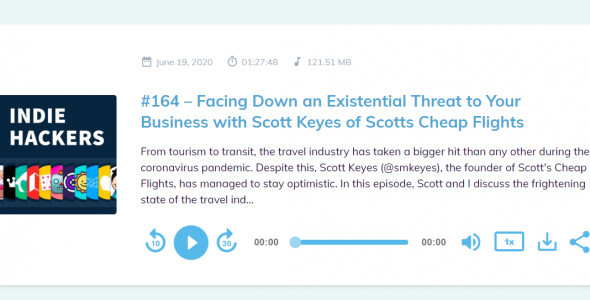More than 914,000 new podcasts were released in 2020. In all of 2019, only 313,000 new podcasts were created. While it’s true that the global situation might have encouraged more people to become podcasters, the rate has tripled in just one year! (according to ListenNotes).
If you are a podcasters, you must be wondering how you can compete with so many other podcasts for listeners attention? This guide will try and help you maximize this potential of growing your podcast audience, attracting new listeners and keep existing listeners to stick around your podcast.
How do listeners search for a new podcast? A recent survey run by The Podcast Host reveals that 40% will search in their podcast directory app (58% of those will search the type of podcast in the app, while 42% will just scroll through the app). 13% will search on Google, and 15% will ask on social media or communities (here your social media presence plays an important part).
The survey is only taking in mind people who already listen to podcasts and are actively searching for new podcasts. A few groups that may not be taken into account in the survey are users who are not currently looking for podcasts, or users that stumble upon a podcast online or via a recommendation (thus, not actively searching for a certain podcast).
It’s important to understand your target audience and develop a strategy to grow your podcast audience. In the next few sections, we’ll talk about different methods to grow your audience –
5 Strategies to grow your podcast audience
1. Create a podcast website – Build an online presence
Having your own podcast website increases the chance listeners would find you via a search on Google or other search engines. When you create your own podcast website, it could potentially get a significant amount of visitors organically, assuming your podcast SEO strategy is done right.
There are multiple benefits in creating a dedicated podcast website – Having your own online hub, a primary place where visitors or listeners could find and listen to episode is key to grow your audience.
A good podcast website should allow you to show all of your episodes, as well as additional content, such as blog posts, show notes or transcripts and more.
By adding more content, beyond the actual podcast/audio, you’re achieving two things –
- For your existing audience – they can get more value from you. While the podcast can be great, additional content, show notes, links, images/docs/videos, newsletters and more, are all different types of content your audience could enjoy beyond the podcast itself.
- For new visitors who have never listened to an episode – they could find the podcast by getting onto your podcast website via a search engine, a recommendation, a link etc., and get hooked to the podcast itself eventually.
A great example for a podcast that leveraged the extra content on their website is the well known podcast “Serial” – by including downloadable material such as letters, affidavits, maps, etc. – the listener can get the entire context discussed during the podcast itself.

If you are not sure where to start with creating a podcast website – we wrote a guide on how to decide which podcast website builder platform to use. Furthermore, the Podcastpage.io podcast website builder was specifically created for podcasters, and is aiming to solve issues we’ve noticed after years of experience in the podcasting world. It’s the best website builder for podcasters! You can signup for free (no credit card required) and simply try it out for yourself today.
A website also comes with additional means of growth. One of the most important things you could do via your website is collect email subscribers and have a stronger reach to your audience. Also, publishing content to the site would boost your SEO score and you can also republish some of the content on additional platforms. There’s a great resource about promoting your podcast and website at Polymash, we recommend reading it for a deep dive into website and podcast promotion.
2. Use your network
Everybody has a network. Whether it’s your family, friends, co-workers, social media followers, or others, you should use them as your initial podcast audience “fan base”. Let them know you are creating a podcast. Share it with them and ask them to share with their own network. You don’t have to be too pushy or really nag about this, but it could help.
It would also make sense to bring into your show (relatively) high profile guests, assuming they can contribute to the content of the episode, so they could then share this with their own network.

Furthermore, you can share your podcast with fellow podcasters. Help them with your knowledge and experience. Hang where they are hanging (podcasters Facebook groups, Slack channels, online communities, etc.). You could probably learn a whole lot from other podcasters as well, so that’s always a good idea.
3. Post on social media
The easiest way to begin is focusing on a specific segment/niche – making your podcast recognizable with a specific category or topic. It could help in finding where your audience is. Starting with a small segment would make it easier to slowly fine-tune your podcast and grow with it.

A) Twitter:
Start by concentrating on comments. When you don’t have a large following base, the easiest way of gaining followers is putting great comments on other users’ posts. Search for specific words or phrases that are relevant to your podcast.
Other recommendations to grow your followers are to always retweet with a comment that adds value. Ask questions – people comment more when it’s a question and not just an idea or statement. If you don’t have anything to say, add value by summarizing other people ideas/ blog posts/ articles or podcast episodes (and of course tag them to give credit for the initial content).
When you publish an episode on a Twitter post – add snippets – something interesting from the episode that would get the followers either to listen to the episode or even share the tweet. You can also share a short video on social networks with a small segment of your podcast.
A popular way to engage your potential audience before an episode is even released, is by asking them which questions should you ask your next guest. This engagement has multiple benefits for you:
- Understand what really interest your listeners.
- Get them excited about the episode even before it is even published.
- Increase exposure with followers of your guests who see their interaction with you, and growing your own potential followers.
B) Reddit
Reddit is a great community to be a part of. You need to learn and experiment with how each subreddit works, and play along their guidelines. Once you are part of it, there are a lot to gain from it.
Here are some relevant subreddits: r/podcasts/, r/podcasting/, r/Podcasters/, PodcastSharing.
When publishing on Reddit, try to add value first. Don’t worry if you get negative comments, it’s part of the game and can really be used as constructive feedback and motivation. Your post could go viral on Reddit, as long as it does not look like you are trying to sell or push anything.
Join other subreddits that are relevant to your niche – where you listeners might be hanging out. You could actually find ideas there for new topics for your episodes or even guests for your show.
C) Facebook
You can use Facebook in multiple ways ways. For example, join a podcasters group and be part of the community. Another option is to create a page or a group that is dedicated to your podcast. People could follow that page and interact with you and with other listeners.
Additionally, you can search for groups that your potential listeners might participate in, or are relevant to the topic of your podcast.
4. Leverage Podcast Directories
You should add your podcast to every directory out there. There’s nothing wrong with more exposure. It’s not always easy to be discovered on those platforms as they display so many other podcasts, but it’s good to be featured on as many directories as possible.
Try to add relevant keywords, titles and descriptions to your RSS feed. Add a podcast category or tags so it will make it easier to find your podcast when listeners are searching for a topic and not a specific podcast name.
We’ve gathered below a list of 15 popular podcast directories that you can start with:
- Apple Podcasts
- Spotify
- Google Podcasts
- Stitcher
- Podcast Addict
- ListenNotes
- TuneIn
- Podcast Republic
- IHeartRadio
- Radio.com
- Deezer
- Podchaser
- Pandora
- PocketCasts
- PlayerFM
5. Try creative competitions or giveaways
People tend to share more when they have something to gain. Be creative or borrow ideas from others.
Recent giveaways we heard about included; Pieter Levels (Nomad List) gave away a MacBook – gaining him 10k new followers on Twitter. TheHustle newsletter is giving away a Tesla, and there are many other examples.

It doesn’t have to be an expensive giveaway or really high profile like those example above, there are many things you can offer that are either free or only require time, rather than purchasing an actual product. You can also partner up with a sponsor or company that is relevant to the topic of your podcast, and they could be interested in providing the gift for the giveaway.
Conclusion – Growing your podcast audience
The most important thing you could do to grow your podcast audience is to produce quality content for your podcast. There is no substitute for great content, but with that said, you can always try to promote it in additional ways.
Try different methods of promotion, and stick to the ones that seem to work well. Check your analytics, understand where your listeners are coming from. Recognize who are your most avid fans and try to get more insights from those.
We’ve covered 5 different methods of growing your podcast in this article, let’s run a quick recap –
- Create a podcast website – Your website can be the main growth engine for your podcast. It is really important to gain control over your brand and podcast. Check out Podcastpage.io for a website builder for podcasters.
- Use your network – Your friends, social media followers, and colleagues can always help you promote your podcast. Next, reach out to some of them (without spamming anyone, of course!) and see if they are willing to help.
- Use social media – Social media can help you get more followers. Additionally, you can engage in another medium where both followers and non-followers could see your public activity and posts.
- Podcast directories – Make sure you are not impossible to find. Don’t limit your podcast just to one directory, publish your podcast on as many platforms as possible.
- Giveaways – You can run a giveaway or a special promotion. This could become viral and attract hundreds of new listeners!



